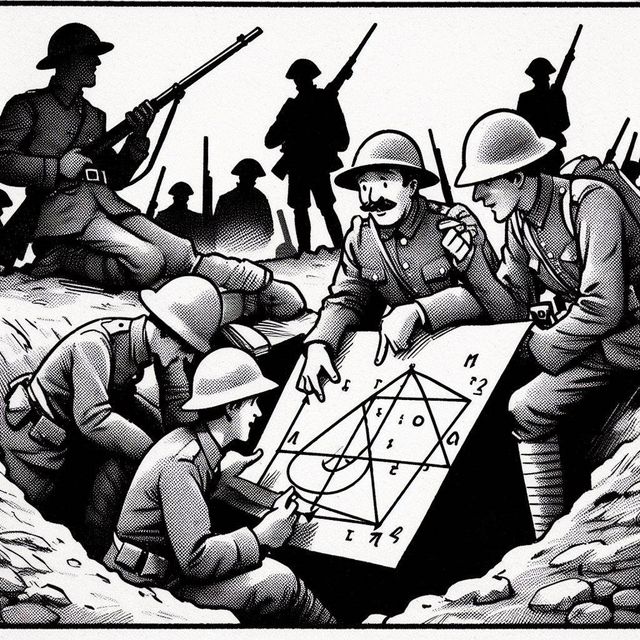-
Vijay Fafat
- Published on
Pythagoras Theorem (or some algebraic operations like square-roots or mental arithmetic) is a device used sometimes to stand in for mathematical erudition, intellectual thinking and the like. In “A Matter of Geometry”, the author weaves a tale of sarcasm and a bit of hilarity around this point, if one can overlook the fact that it is set on a battleground, with death, destruction and mayhem a persistent backdrop. One also must look past the stereotypical implication - perhaps justified - that a mathematical / analytical brain may sometimes get too enamored by theories and lose sight of some practical aspects (e.g. designing a pen which writes upside down in space, not recalling that a pencil can work just as well)
This is also a short story where the full statement of the Pythagorean theorem appears 3 different times, something of a first, and extremely hilarious :-)
Sergeant Brinton is a ‘muscular, square-jawed, old’ soldier who fervently believes that the army lost something vital when it started to focus more on academic knowledge and hard sciences like mathematics for promotions within its ranks rather than the primal spirit of fighting. He complains that someone too young to be a soldier could get a command post if “he’s had his nose inside every military course book and snores mathematics in his sleep.”. As he puts it further:
“It used to be” said Sergeant Brinton rather bitterly, “that soldierin’ was a red-blooded man’s business. Now it’s got to be a mere matter of cold-blooded calculation where the biggest man in the end is the one with the longest, nose and the biggest pair of specs hung on the end of ‘em.”
His army unit, the “Federals”, is battling Mexican rebels in New Mexico. Sergeant Brinton has all the experience and knowledge which comes of age to command the unit, but is relegated to guard duties instead of forefront attack posting. He laments to the narrator:
“There’s just one thing” muttered the sergeant , as his superior strode off , “that stands between [me and] my issuing orders to that chap. I can’t get higher mathematics through my head—though when it comes to push and dash and tactics, why… ”
[…]
“Say!”, Sergeant Brinton turned on me sharply, “ Prove that the square upon the hypotenuse of a right-angled triangle is equal to the sum of the squares erected upon the other two sides.”
“What’s that got to do with guarding the camp?”, I asked him.
“Everything in the world,” he asserted. “That’s the reason I’m here instead of at the head of the troop. I couldn’t prove it . The best thing that I can prove is that one American regular is worth two ordinary fighting men or twenty greasers. The best thing I ever proved was that sometimes, a brisk frontal attack is more effective than beatin’ around the bamboos a week tryin’ out a newfangled enveloping manoeuvre. That’s the reason l am barred from commission.”
Brinton and the narrator watch a few days of day-long skirmishes and firings between the 2 sides which maintain an un-shifting impasse. Of the leadership of the other side, Brinton derisively observes:
“Bet there’s more trigonometry experts out there in command than you’d find in a State university ; and as much red blood as you’d find in a frog.”
As a tactical matter, Brinton propounds that there are 2 other ways an army could get defeated than just tactical manoeuvring. Either a headlong charge taking the enemy by surprise, or an error, a “self-goal” by the enemy, where the enemy leadership decides to retreat while they have an upper hand. This latter bit has the added appeal that it disheartens and frustrates the rank-and-file of the enemy - to be close to the jaws of victory and to then retreat is a deflation which sucks the air out of their battle-balloons. And so, Sergeant Brinton, without anyone’s knowledge, infiltrates the enemy unit one day and leads their offensive against the Federals, beating the Federals back with glorious charges… and in the end, just walks away from the field, scattering the dumbfounded rebels. No one knows what happened or who this new rebel leader was who had effectively handed the victory to the Federals. Later in the evening, as the Federals are discussing the bizarre occurrence of the day, the conversation unfolds:
“But whatever got into him to quit!”, exclaimed first one man and then the other, without any satisfactory theory being offered.
“Maybe he never had any intention o’ carrying the thing through—maybe he was just experimenting,” suggested Sergeant Brinton, in his turn , “ and didn’t want to really take sides too strong in the fracas.”
Several glances of contempt at such shallow judgment were cast upon Brinton. Otherwise his remark was ignored. “Or maybe” the sergeant added in a caustic drawl, “maybe he was tryin’ to prove that the square upon the hypotenuse of a right-angled triangle is equal to the sum of the squares erected upon the other two sides.”
In the end, the Sergeant goes to the narrator, a medical personnel, to get treatment for the shoulder wound he sustained during the fight.
“You being the only civilian in the camp, I’m asking you to do it up for me. I’m taking no chances on any of the others.”
He bared a big block-red splotch on his shoulder - an ugly flesh wound that was in sad need of attention.
“ Do you mean to say that you…”, I gasped.
“ I admit nothin’,” he replied coolly. But if I was goin’ to bet on it I’d bet that, the chap who led that line couldn’t prove that the square upon the hypotenuse of a right-angled triangle is equal to the sum of the squares erected upon the other two sides.”
